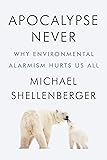
Apocalypse Never

As such, the intense media and public focus on plastic, like the intense focus on climate change, risks distracting us from other equally important—perhaps more important—threats to endangered sea life, which may be easier to address than climate change or plastic waste.
Michael Shellenberger • Apocalypse Never
Rather than being the main culprit in the destruction of forests, factories have been, and remain, an engine for saving them.
Michael Shellenberger • Apocalypse Never
Humankind could only redeem itself from the scourge of nuclear weapons by realizing the dream of universal prosperity—and that required cheap and abundant energy.
Michael Shellenberger • Apocalypse Never
Humans have been moving away from wood to fossil fuels for hundreds of years. Globally, wood went from providing nearly all primary energy in 1850 to 50 percent in 1920 to just 7 percent today.
Michael Shellenberger • Apocalypse Never
Humankind’s use of wood has peaked and could soon decline significantly.20 And humankind’s use of land for agriculture is likely near its peak and capable of declining soon.21 All of this is wonderful news for everyone who cares about achieving universal prosperity and environmental protection.
Michael Shellenberger • Apocalypse Never
We must change our thinking, too. Just as we overcame our preference for authentic furs, ivory, and tortoiseshell, we must retrain our preferences toward domesticated meats and away from wild meats, including fish, for wild animals once again to flourish.
Michael Shellenberger • Apocalypse Never
It was only after humans started living in cities, and growing wealthier, that they started to worry about nature for nature’s sake.47 Europeans who, in the nineteenth century had viewed the Amazon as “jungle,” a place of danger and disorder, came to see it in the late twentieth century as “rainforest,” a place of harmony and enchantment.
Michael Shellenberger • Apocalypse Never
They wanted a life more like mine. And I knew, of course, that I didn’t want to be a small farmer. Why did I ever think anyone else wanted to? The reality I lived, up close and in person, made it impossible for me to hold on to my romantic views.
Michael Shellenberger • Apocalypse Never
I see what’s happening now, and the election of Bolsonaro, as a reflection of major mistakes in [environmentalist] strategy.”